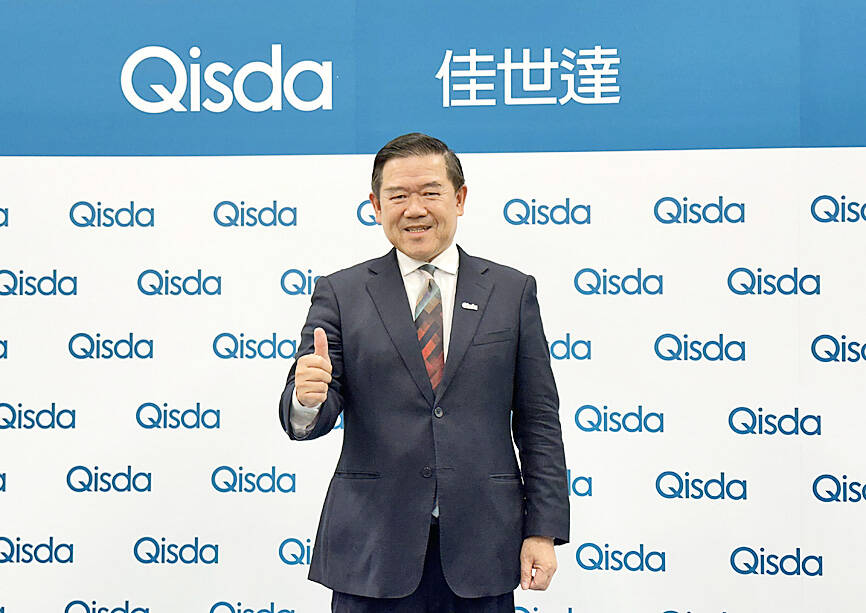Electronics manufacturer Qisda Corp (佳世達) yesterday said revenue performance in the second half of the year would be flat from the first half, as third-quarter sales came in lower than expected amid weak demand for information technology (IT) products and networking and communication devices.
The company expects its high valued-added businesses — including hospital operations, medical products, smart business solutions and networking and communications products — to provide stable support to its revenue this quarter, with demand for IT products, mainly monitors and projectors, slowly picking up, it said in a presentation document released following the company’s earnings conference.
The company remains confident that profit performance in the second half of the year would be better than the first half, Qisda chairman Peter Chen (陳其宏) said, citing continued improvement in gross margin.

Photo: Fang Wei-chieh, Taipei Times
Gross margin, a key profitability gauge, increased 2.2 percentage points year-on-year to 16.6 percent in the July-to-September quarter, and rose 2.3 percentage points to 16.3 percent in the first three quarters of the year, both the highest in 20 years, which Chen attributed to contributions from high value-added products and services.
“After revenue from high value-added businesses accounted for more than half of the top line last year, the company’s next goal is to see those businesses contribute more than half of the bottom line by 2027,” he said.
As for next year, Chen said the visibility of the industry remains unclear, given factors such as the war between Russia and Ukraine, the conflict between Israel and Hamas, and sticky inflation worldwide. As a result, the company is to hold a cautiously optimistic view about its revenue and earnings outlook next year, he said.
The company’s consolidated revenue last quarter decreased 3.34 percent quarter-on-quarter and was down 16.13 percent year-on-year to NT$50.37 billion (US$1.56 billion) due to slower-than-expected recovery in monitor shipments and delayed delivery of networking and communications devices such as Internet protocol cameras, routers and switches.
Net profit grew 17.3 percent quarterly to NT$1.2 billion, which translated into earnings per share of NT$0.61, due to an increase in non-operating gains. But net profit still fell 81.1 percent annually, the company said.
In the first three quarters, revenue dropped 16.76 percent year-on-year to NT$152.93 billion and net profit decreased 67.67 percent to NT$2.55 billion, with earnings per share of NT$1.3, it said.
The IT business accounts for 43 percent of the company’s overall revenue in the first three quarters, followed by smart business solutions at 16 percent, networking and communications segment at 14 percent, medical business at 12 percent, high value-added services at 8 percent and 7 percent for other products, the company said.

Nvidia Corp’s demand for advanced packaging from Taiwan Semiconductor Manufacturing Co (TSMC, 台積電) remains strong though the kind of technology it needs is changing, Nvidia CEO Jensen Huang (黃仁勳) said yesterday, after he was asked whether the company was cutting orders. Nvidia’s most advanced artificial intelligence (AI) chip, Blackwell, consists of multiple chips glued together using a complex chip-on-wafer-on-substrate (CoWoS) advanced packaging technology offered by TSMC, Nvidia’s main contract chipmaker. “As we move into Blackwell, we will use largely CoWoS-L. Of course, we’re still manufacturing Hopper, and Hopper will use CowoS-S. We will also transition the CoWoS-S capacity to CoWos-L,” Huang said

Nvidia Corp CEO Jensen Huang (黃仁勳) is expected to miss the inauguration of US president-elect Donald Trump on Monday, bucking a trend among high-profile US technology leaders. Huang is visiting East Asia this week, as he typically does around the time of the Lunar New Year, a person familiar with the situation said. He has never previously attended a US presidential inauguration, said the person, who asked not to be identified, because the plans have not been announced. That makes Nvidia an exception among the most valuable technology companies, most of which are sending cofounders or CEOs to the event. That includes

TARIFF TRADE-OFF: Machinery exports to China dropped after Beijing ended its tariff reductions in June, while potential new tariffs fueled ‘front-loaded’ orders to the US The nation’s machinery exports to the US amounted to US$7.19 billion last year, surpassing the US$6.86 billion to China to become the largest export destination for the local machinery industry, the Taiwan Association of Machinery Industry (TAMI, 台灣機械公會) said in a report on Jan. 10. It came as some manufacturers brought forward or “front-loaded” US-bound shipments as required by customers ahead of potential tariffs imposed by the new US administration, the association said. During his campaign, US president-elect Donald Trump threatened tariffs of as high as 60 percent on Chinese goods and 10 percent to 20 percent on imports from other countries.

INDUSTRY LEADER: TSMC aims to continue outperforming the industry’s growth and makes 2025 another strong growth year, chairman and CEO C.C. Wei says Taiwan Semiconductor Manufacturing Co (TSMC, 台積電), a major chip supplier to Nvidia Corp and Apple Inc, yesterday said it aims to grow revenue by about 25 percent this year, driven by robust demand for artificial intelligence (AI) chips. That means TSMC would continue to outpace the foundry industry’s 10 percent annual growth this year based on the chipmaker’s estimate. The chipmaker expects revenue from AI-related chips to double this year, extending a three-fold increase last year. The growth would quicken over the next five years at a compound annual growth rate of 45 percent, fueled by strong demand for the high-performance computing